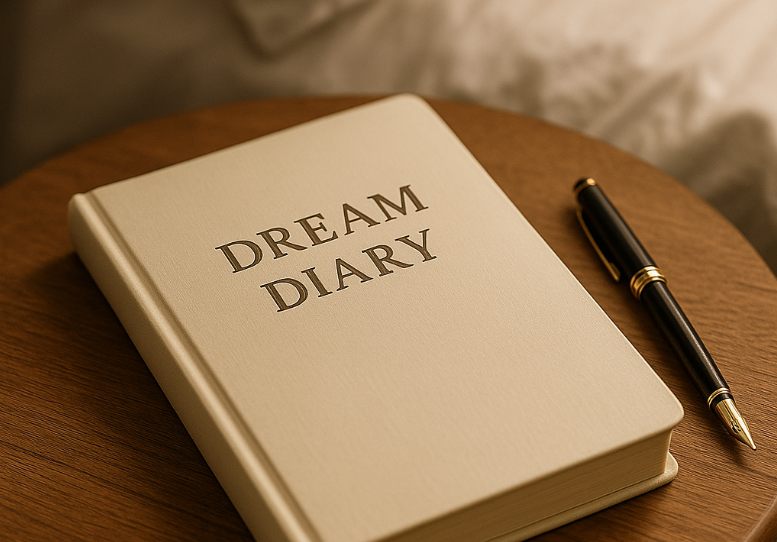Dreams have fascinated people for thousands of years. I am one of those people who dream every night, and sometimes I can have 2 or 3 totally unrelated dreams, but all of them seem to me like a 5-act play. I rarely dream of being in public naked, but I do dream about being on stage and not having learned my lines, something that is much more akin to my real fears and anxieties. So, I’ve often wondered about how to interpret dreams and what they mean, which led me to some research and writing a dream diary, which has helped me figure our a lot of things, so I hope this article will help you in your own search for meanings behind your dreams.
What does it mean to interpret your dreams?
I often find that dreams are talked about as messages from the subconscious, a source of hidden wisdom, and sometimes even as spiritual guidance. In many cultures, dreams are seen as important tools for personal insight, travels in other dimensions, and even connection with the Divine. Interpreting dreams is not just about decoding strange images or stories from your sleep. It’s a way for us to better understand our own emotions, fears, hopes, and patterns.
In spiritual traditions like Hinduism and Buddhism, dreams are thought to offer insight into the deeper layers of consciousness or the soul’s ultimate adventure. Ancient Egyptians wrote down their dreams, believing they predicted the future or revealed hidden truths. Carl Jung, a famous psychologist, saw dreams as pathways to the unconscious mind, where inner conflicts and symbols could be gently decoded and understood. By paying attention to your dreams, you can bring more awareness to your waking life and invite your intuition to play a bigger part in your decisions and well-being.
So, I’ve found that if I learn to interpret my dreams thoughtfully, I can open another door to personal growth and spiritual discovery. Not all my dreams are like this; some can easily be interpreted as my subconscious replaying things that have happened in the day. But there are also other times, when I feel the invitation to listen to the messages my mind and spirit are trying to send me at night.
 This article contains affiliate links. For more information, see our Affiliate Disclosure.
This article contains affiliate links. For more information, see our Affiliate Disclosure.
Why does dream interpretation matter?
Dreams aren’t random nonsense, even when they seem confusing or bizarre. Most spiritual teachers and psychologists agree that dreams reflect what’s happening deep in the mind and heart and that the mind layers the dreams with symbols and images that have meaning for us.
I find that consciously listening to my dreams helps me:
- Notice or identify worries and stresses I might have ignored during the day
- Process emotional conflicts or big life changes, sometimes resolving them, and sometimes highlighting things to work on
- Get creative ideas or unexpected solutions
- Connect with symbols and guides that support my spiritual adventure
- Feel more in tune with my intuition and inner voice
As I’ve said, I dream every night and I mostly remember my dreams in the morning. I always have since I was a small child. So, for me, this is something that is very personal and close to my heart.
Over the years, by making a little time and space for dream interpretation, I’ve become more likely to see patterns, such as recurring themes, people, places, and feelings. I don’t need to be a dream expert; I just need a willingness to observe and reflect. Even simple curiosity can open doors to greater understanding. If you want to understand yourself and your own dreams better, read on to find some simple, practical steps you can take.
Simple steps to interpret your dreams
I’ve found that dream interpretation works best when it’s part of a regular, relaxed routine. It doesn’t have to be complicated and the more you try to force it, the less it works. Sometimes it’s best just to jot down a few images or feelings you can remember and leave it at that. Over time, you may notice more of a pattern.
Here’s how I make meaning from my dreams, step by step.
1. Record your dreams as soon as you wake
Dreams fade fast, so I keep a notebook by my bed, but you could use a voice recorder on a phone. Even scribbling a few words is useful to trigger your memory of details. If you find you have trouble recalling anything, don’t worry. Just lie still for a moment with your eyes shut, and let any fragments you have left come to the surface. I jot down people, places, emotions, colors, actions, and anything that stood out, no matter how odd. Sometimes, a single image or feeling is enough to spark the rest of the memory later in the day.
 interpretation
interpretation
2. Notice the feeling first
Before I get into interpreting symbols, I ask myself: how did the dream make me FEEL? Was I calm, anxious, sad, or inspired? The main feeling often reveals more than the plot or images. For instance, a dream about being chased might show anxiety, while flying is often interpreted as meaning a sense of freedom. Its important to give yourself permission to feel whatever comes without judgment. Sometimes, I even write down a few words about the atmosphere or emotional mood before focusing on the story.
3. Look for patterns, not perfection
Some people find that their dreams repeat certain themes. When I was a child, I had a recurring dream about being in an old house trying to find my teddy, which had been taken by a witch. I remember searching the rooms and cupboards of the house looking for my favourite toy.
Nowadays, I often find I’m trying to escape someone chasing me and I have to find a way out of several triky situations, a bit like a James Bond movie. But that’s just me.
You may dream of water, houses, or being late. Instead of taking every symbol literally, I try to look for repeating images, emotions, or stories. These patterns usually tell me what’s on my mind or what my spirit is working through. Some people interpret dreaming of water to mean new spiritual growth, or dreaming of old friends to mean it may be time to reconnect with parts of yourself that you feel you have left behind. Jotting down a dream log over weeks can uncover these repeating elements and give you a sense of direction in your dreamwork.
4. Explore the symbols in context
Symbols in dreams rarely mean the same thing for everyone and if you are using a dream interpreting book, then be wary of general ideas about what things mean. There can be some consistency with commonly held ideas but it’s better to ask yourself, “What does this me to me?” Start with how the symbol link to your own life. For example, I love snakes and consider them to represent healing and ancient wisdom. My daughter would take this to mean something fearful and underhand. Meanings of all things depend on your personal experience, culture, and feelings in the dream. So ask yourself what this symbol or person means to you, and how you currently relate to it. As mentioned, sometimes looking up common meanings in dream dictionaries helps, but your own associations and interpretations will matter most. Dreams are personal, and sometimes a symbol has deep meaning only because of a memory or event in your own past.
A word about feelings here – feelings are the language of the universe – they transcend words and are a much more true communication than using speech or words. If you want to know more, see my article on The Language of the Universe.
5. Listen for guidance, not predictions
I treat my dreams as gentle guides, not fortune tellers. There are instances where people have had prophetic dreams but they tend to be very vivid and have a different quality to them. So, rather than expecting my dreams to predict the future exactly, I look for advice or insight. If I dream about being lost, maybe I need more direction in waking life. If I dream about clear skies, maybe it’s time to trust the calm. I trust my intuition to highlight what’s useful, and I stay open to surprises. Dream messages may show up as feelings, images, or even puzzles that make more sense in hindsight.
It’s good to remember here that we live in a world of infinite possibilities. At any moment, the way that our life could unfold is determined by the choices we make in that moment, and nothing is ‘set in stone’ because we all have free will to create our own future. One interpretation of dreams could be that they are a way of playing out some of those potentialities in a non-physical or imaginary way.
Common Dream Symbols – and what they MIGHT mean
While dreams are deeply personal and unique to each individual, certain themes appear again and again across cultures and experiences. Below are some commonly reported dream elements and their generally accepted interpretations. But remember – these are not fixed meanings. Think of them as invitations to reflect rather than strict rules.
Falling – Often linked to feeling out of control, insecure, or overwhelmed. It might suggest you’re navigating a situation where you feel unsupported or vulnerable
Being chased – Usually points to avoidance. You may be running from a person, fear, responsibility, or emotion you’re not quite ready to face
Flying – Can represent freedom, spiritual elevation, or a shift in perspective. Sometimes it symbolises breaking free from constraints or daily burdens
Teeth falling out – A surprisingly common dream, often tied to anxieties around communication, appearance, ageing, or loss of control
Being naked in public – Typically reflects vulnerability, shame, or the fear of being judged or “exposed” in some way
Water – Symbolic of emotions or the subconscious. Calm water may suggest peace, while turbulent or murky water might reflect inner turmoil or uncertainty
Pregnancy or giving birth – May represent creativity, transformation, or something new being “birthed” in your life – not necessarily a child, but perhaps a project, relationship, or insight
Death – Often misunderstood. In dream language, death tends to symbolise transformation, letting go, or the end of a chapter
Losing your voice or being unable to speak – Can relate to feeling silenced, unheard, or powerless in waking life
Being late or missing something important – Might suggest stress, fear of failure, or feeling unprepared. It could point to pressure you’re putting on yourself
Snakes – Depending on your personal associations, snakes can symbolise transformation (like shedding old skin), fear, sexuality, or hidden threats
Houses – Often represent the self. Different rooms may relate to different aspects of your life or subconscious. An attic might symbolise memory or spirituality, while a basement could relate to hidden fears
? Your dreams speak your language.
Always ask: How did I feel in the dream? What does this symbol mean to me?
A snake to one person might feel sacred – to another, terrifying.
Tips for deepening your dream work
For me, dreaming is an everyday occurrence, but I know many people who say they rarely dream and remember their dreams even less often. One is not right and the other wrong – it’s just where we are now. However, if you want to deepen your understanding of dreams, then here are a few tips:
- Be patient. Sometimes meaning takes time to unfold, and not every dream makes sense right away. I keep notes and see what connects over weeks or months
- Ask for a dream. If I have something that I’m particularly worried or concerned about, then before I sleep, I often set an intention, asking for help, such as, “Show me guidance for my next step.” Even if nothing comes the first night (which is common), I find this habit gently invites more awareness. Sometimes, after a few nights of asking, I notice a shift or a new kind of dream experience starting to appear
- Stay grounded. Emotional dreams can be intense. There are many times when I’ve woken up and felt negative emotions – not because of a nightmare but because my dream felt real. I’ve also often woken up and felt that I was ‘not quite all back in my body’ which is an unusual experience but one I’m not very used to. To counter these things, I use grounding techniques like meditation and breathwork to recollect my energy, especially after strong or unsettling dreams
- Share carefully. Some dreams are personal and need to remain that way. I don’t tell my dreams to others often, sometimes if I have a particularly funny or strange one, but if I need another perspective, I’m always discerning about who I ask and choose trusted friends or spiritual mentors. Even then, if you do this, you need to remember that only you know what feels true for you. If someone gives you advice, you can take what resonates and leave the rest
- Use creative practices. Drawing dream images, writing poetry, or meditating on a dream symbol can reveal deeper layers. Sometimes insight comes through something you create or an idea that seems to pop into your head later in the day, rather than analysis. Creative expression might light up an idea that the logical mind missed
Spiritual traditions and dream interpretation
Many spiritual paths give guidance on understanding dreams. I find these traditions helpful when I want to explore things further, and you can read about these in our article on dreams across cultures.
By learning from different wisdom traditions, you can enrich your own dream practice and get a wider sense of what your dreams might mean on different levels.
Recommended resources for dream exploration
There are many useful resources that I’ve come across when looking at dream work. If you want to read more, these are good places to start:
- “Inner Work: Using Dreams and Active Imagination for Personal Growth” by Robert A. Johnson. A straightforward guide for exploring dreams and working with them practically. This book offers exercises and gentle explanations that are perfect for beginners.
- “The Complete Dream Book” by Gillian Holloway. Clear explanations of common symbols with a balanced approach. The author shares real stories as examples, making dreamwork accessible.
- “Man and His Symbols” by Carl Jung. A foundational work on dream imagery, symbols, and personal growth. Jung’s approach can feel deep at first, but it is well worth checking out for inspiration on how to think about dream symbols.
- “The Tibetan Yogas of Dream and Sleep” by Tenzin Wangyal Rinpoche. Advanced spiritual practices for those curious about conscious dreaming. This book explores using dreams as a spiritual tool, going beyond basic interpretation.
- App recommendation: I use simple apps like DreamKeeper or pen and paper journals to keep consistent records. This helps me see patterns and track my growth over time.
Visiting community meditation groups or online forums can also bring new insights, as shared dreamwork has deep roots in many traditions. Connecting with others who value dreamwork can boost motivation and give you a sense of belonging as you track down the meanings in your dreams.
Trusting your adventure with dreams
Interpreting dreams is a gentle process that unfolds in its own time. Sometimes a dream brings instant clarity. Other times, answers come slowly through reflection, discussion, or meditation. The most important part for me is to trust my own feelings and associations. No dream expert knows my story better than I do, and no one knows your life and situation better than you.
Wrapping up, whether you are just getting into dreamwork or have been keeping a dream journal for years, trust yourself and enjoy the adventure—dreams have much to teach you, night after night.

Related posts
How to meditate to find your spirit animal





Hi @Gail
This was such a very interesting read for me. I’ve always been intrigued by the idea that our dreams might be coded ‘messages’ from our subconscious, and this guide really helped see a more ‘scientific’ process of decoding them.
I especially appreciated the emphasis on personal symbolism—how the same image can mean something entirely different depending on our own experiences. That really struck a cord for me. I’ve had recurring dreams in the past that felt random at first, but once I started reflecting on them patterns began to emerge that connected with my day to day life.
As a young lad, I was captivated by historical interpretations of dreams—from the mystical insights of Oracles to the dreams recounted in the Joseph story. That fascination has never left me, and it’s amazing to me how dreams can still stir up emotions or memories that I did not even realize where still lingering. Some of mine have taken me back to childhood moments I hadn’t thought about in years— summer nights, the sound of cicadas, the scent of old books or running for our bikes to flee to ‘mean kids’. It’s like my mind is gently nudging me to pay attention to something I’ve overlooked in the present.
Thanks for such a clear breakdown. It makes me want to be more intentional about exploring my dreams.
Hi Mark. Thanks for your thoughtful comments here and I’m so pleased that you liked the article and found it helpful in some way. Being an avid dreamer (it’s just the way it’s always been), I have also always been fascinated by dreams and I know that they are giving me messages to help me grow and develop. That might mean facing my fears or giving me clues to a solution I’ve been looking for, but they are rarely things to ignore.
All the best with your new intentions. Gail
I absolutely loved the part where you described dreams as “5-act plays” what a fun and totally relatable way to look at those nighttime epics! And the idea that dreams are gentle guides rather than crystal balls really hit home. It reminds me how beautifully spiritual it is to treat our inner world with reverence and curiosity, instead of pressure or fear.
The personal approach to symbols is such a spiritual game-changer. Why should a snake mean the same thing to everyone when God speaks in our language, tailored to our own heart and history? It’s like your dreams are spiritual post-it notes from the universe, waiting for you to read them with love. Here’s what I’m wondering now: Could your dream symbols be evolving as your spiritual life grows?
Hi Ravin. Thanks for your thoughts here. I’ve just had another two 5-act plays last night!! What a marathon! I’m glad you like the interpretation about personal symbols which I firmly believe to be true. Just think about how much different things mean to different people all over the world? It has to be interpreted personally. And yes, to answer your question, I think that symbols can change and evolve as you learn more about them through your spiritual awakening. There are things I know now that I would have no clue about a few years ago, such as sacred geometry, merkabas, and tetrahedrons, but those things mean something very special to me now.
All the best. Gail